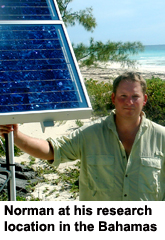


|
|
|
|
|
|
|
|
|
|
|
|
||||||||||||||
|
||||||||||||||
|
|
||||||||||||||
|
||||||||||||||
|
Posted
07/24/2007
Dr. Sean Norman of the Arnold School of Public Health expects San Salvador – and its island neighbor, Highborne Cay -- similarly will be keys to the discovery of how bacteria communicate in natural ecosystems. It is a process that scientists call quorum sensing. And while it has been studied in the laboratory, Norman is using a $774,000 National Science Foundation grant to investigate the process in “real world” settings. Norman, a new assistant professor in the Department of Environmental Health Sciences, said that in addition to adding to the body of knowledge about bacteria, a deeper understanding of quorum sensing may provide a means of enhancing the beneficial activity of some bacteria, such as the breakdown of environmental contaminants or inhibiting the activity of other disease-causing bacteria. The three-year study begins later this month when Norman visits San Salvador to collect samples from bacterial mats found in many of the island’s hypersaline ponds. These extreme environments consist of conditions that inhibit all but specially adapted life. The mats found in these environments are made up of a number of layered microbial communities, and contain a surprisingly high diversity of bacterial species; one that surpasses that of tropical rain forest communities. As part of the same trip, Norman also will take samples from the ocean at Highborne Cay where bacteria have formed into microbial mat communities called stromatolites. Among the oldest structures on earth, marine stromatolites are finely-laminated rock structures, consisting of horizontal layers of calcium carbonate precipitate. They are produced through the organized activities of several groups of bacteria. Understanding how bacteria communicate in these ancient ecosystems may help us understand how cellular communication originally began on early Earth. On his return from the island, Norman will process his samples and analyze the novel genomic composition of the microbial mat communities at the new USC Environmental Genomics Laboratory located in the Arnold School’s Public Health Research Center. The process will involve extracting and separating bacterial genomes from the complex mat communities and identifying genes that either activate or repress quorum sensing. Norman plans to disseminate the results of the study in peer-reviewed scientific journals and via a website available to the general public. The study team also will make poster and platform presentations at an array of scientific meetings each year. Norman is principal investigator for the study. His co-PI will be Dr. Alan Decho, who also is studying quorum sensing. Norman, who grew up on a farm in Georgia, earned a bachelor’s degree from the Department of Biological Sciences at Augusta State University in 1995. He
earned his master’s degree in environmental studies from the Medical
University of South Carolina and the University of Charleston in 1999.
He earned his doctorate in |
| Columbia, SC 29208 • 803-777-7000 • sphweb@gwm.sc.edu | © University of South Carolina Board of Trustees |
 The
island of San Salvador was the key that unlocked the gate to the New
World when Columbus arrived there in 1492.
The
island of San Salvador was the key that unlocked the gate to the New
World when Columbus arrived there in 1492.